
ibm-generative-ai
IBM-Generative-AI is a Python library built on IBM's large language model REST interface to seamlessly integrate and extend this service in Python programs.
Stars: 226
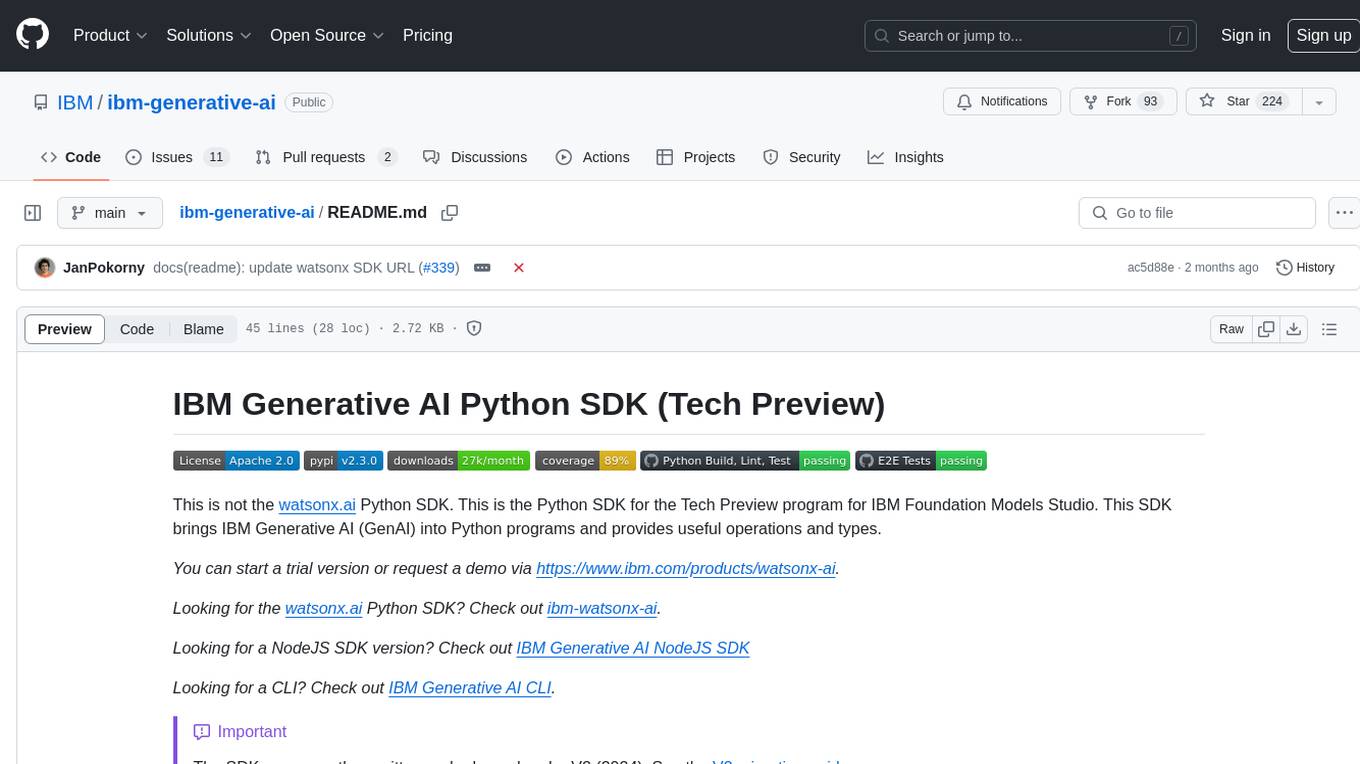
IBM Generative AI Python SDK is a tool designed for the Tech Preview program for IBM Foundation Models Studio. It brings IBM Generative AI (GenAI) into Python programs, offering various operations and types. Users can start a trial version or request a demo via the provided link. The SDK was recently rewritten and released under V2 in 2024, with a migration guide available. Contributors are welcome to participate in the open-source project by contributing documentation, tests, bug fixes, and new functionality.
README:
This is not the watsonx.ai Python SDK. This is the Python SDK for the Tech Preview program for IBM Foundation Models Studio. This SDK brings IBM Generative AI (GenAI) into Python programs and provides useful operations and types.
You can start a trial version or request a demo via https://www.ibm.com/products/watsonx-ai.
Looking for the watsonx.ai Python SDK? Check out ibm-watsonx-ai.
Looking for a NodeJS SDK version? Check out IBM Generative AI NodeJS SDK
Looking for a CLI? Check out IBM Generative AI CLI.
[!IMPORTANT] The SDK was recently rewritten and released under V2 (2024). See the V2 migration guide.
pip install --upgrade ibm-generative-ai
- Do you want to contribute to the project? IBM Generative AI is an open-source project that welcomes the community to contribute with documentation, tests, bug corrections, and new functionality in the form of extensions. Please read our code of conduct to learn the expected behavior from participants that contribute to the project, and our contribution guide to learn the gitflow and steps to submit pull requests.
For Tasks:
Click tags to check more tools for each tasksFor Jobs:
Alternative AI tools for ibm-generative-ai
Similar Open Source Tools

ibm-generative-ai
IBM Generative AI Python SDK is a tool designed for the Tech Preview program for IBM Foundation Models Studio. It brings IBM Generative AI (GenAI) into Python programs, offering various operations and types. Users can start a trial version or request a demo via the provided link. The SDK was recently rewritten and released under V2 in 2024, with a migration guide available. Contributors are welcome to participate in the open-source project by contributing documentation, tests, bug fixes, and new functionality.

devchat
DevChat is an open-source workflow engine that enables developers to create intelligent, automated workflows for engaging with users through a chat panel within their IDEs. It combines script writing flexibility, latest AI models, and an intuitive chat GUI to enhance user experience and productivity. DevChat simplifies the integration of AI in software development, unlocking new possibilities for developers.
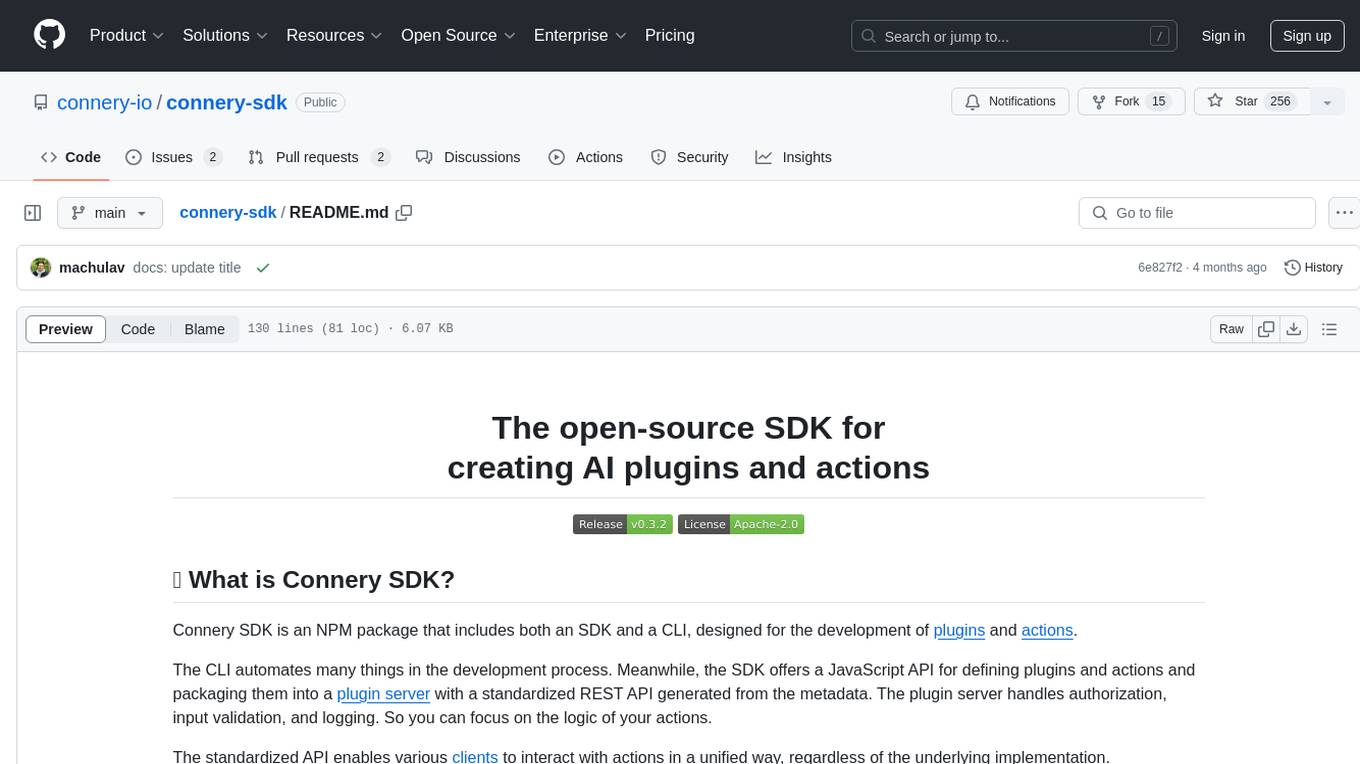
connery-sdk
Connery SDK is an open-source NPM package that provides an SDK and CLI for developing plugins and actions. The SDK offers a JavaScript API to define plugins and actions, which are then packaged into a plugin server with a standardized REST API. This enables automation in the development process and simplifies handling authorization, input validation, and logging. Users can focus on the logic of their actions while the standardized API allows various clients to interact with actions uniformly. Actions can communicate with external APIs, databases, or services, making it versatile for creating AI plugins and actions.
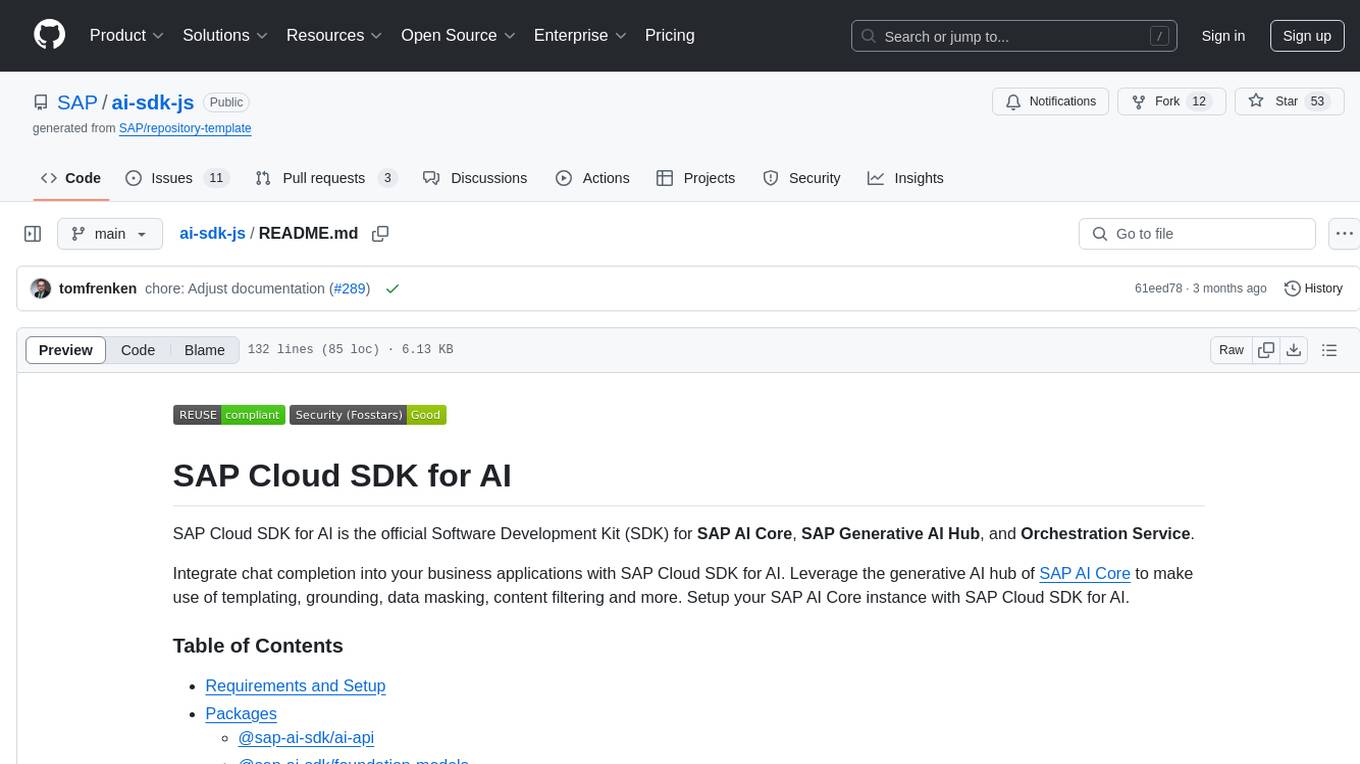
ai-sdk-js
SAP Cloud SDK for AI is the official Software Development Kit (SDK) for SAP AI Core, SAP Generative AI Hub, and Orchestration Service. It allows users to integrate chat completion into business applications, leverage generative AI capabilities for templating, grounding, data masking, and content filtering. The SDK provides tools for managing scenarios, workflows, data preprocessing, model training pipelines, batch inference jobs, deploying inference endpoints, and orchestrating AI activities. Users can set up their SAP AI Core instance using the SDK, which includes packages for AI API, foundation models, LangChain model clients, and orchestration capabilities. The SDK also offers a sample project for demonstrating its usage in TypeScript/JavaScript applications, along with guidelines for local testing and contribution.
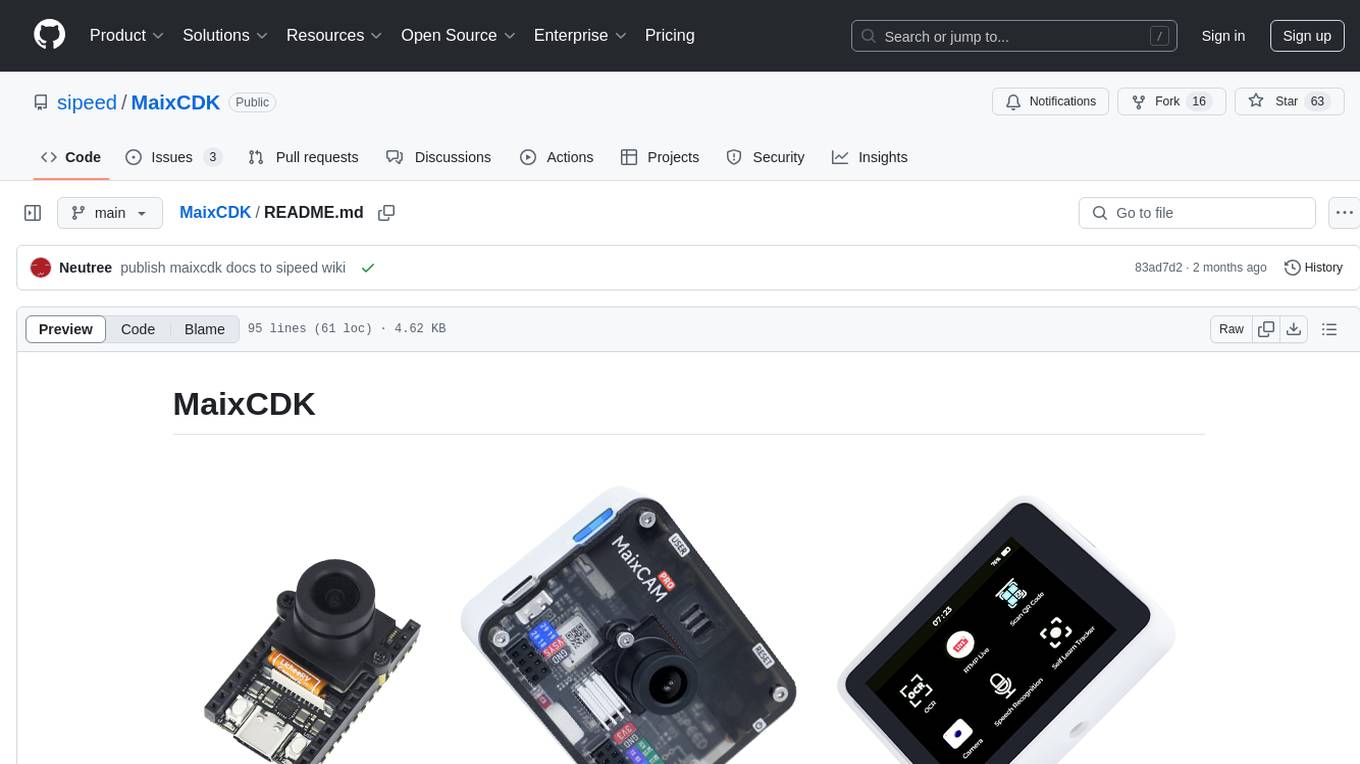
MaixCDK
MaixCDK (Maix C/CPP Development Kit) is a C/C++ development kit that integrates practical functions such as AI, machine vision, and IoT. It provides easy-to-use encapsulation for quickly building projects in vision, artificial intelligence, IoT, robotics, industrial cameras, and more. It supports hardware-accelerated execution of AI models, common vision algorithms, OpenCV, and interfaces for peripheral operations. MaixCDK offers cross-platform support, easy-to-use API, simple environment setup, online debugging, and a complete ecosystem including MaixPy and MaixVision. Supported devices include Sipeed MaixCAM, Sipeed MaixCAM-Pro, and partial support for Common Linux.
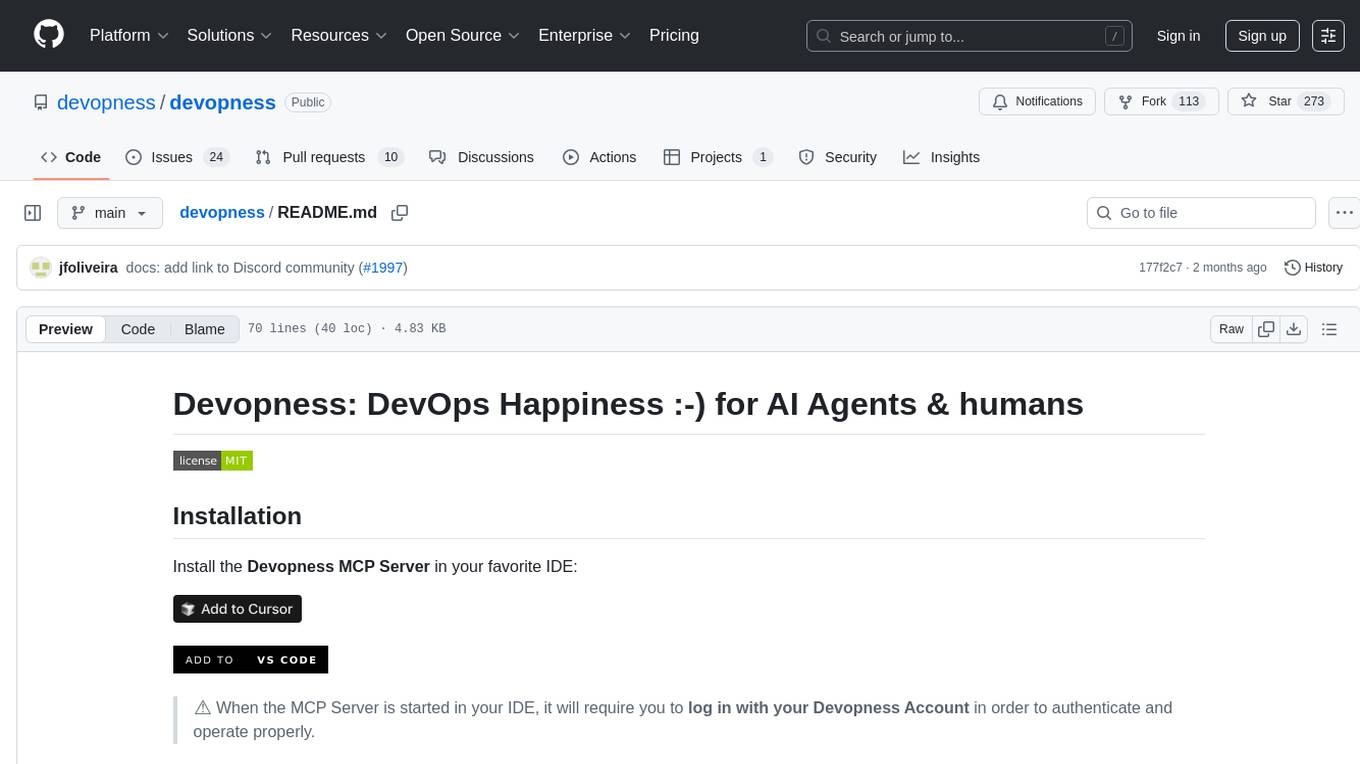
devopness
Devopness is a tool that simplifies the management of cloud applications and multi-cloud infrastructure for both AI agents and humans. It provides role-based access control, permission management, cost control, and visibility into DevOps and CI/CD workflows. The tool allows provisioning and deployment to major cloud providers like AWS, Azure, DigitalOcean, and GCP. Devopness aims to make software deployment and cloud infrastructure management accessible and affordable to all involved in software projects.
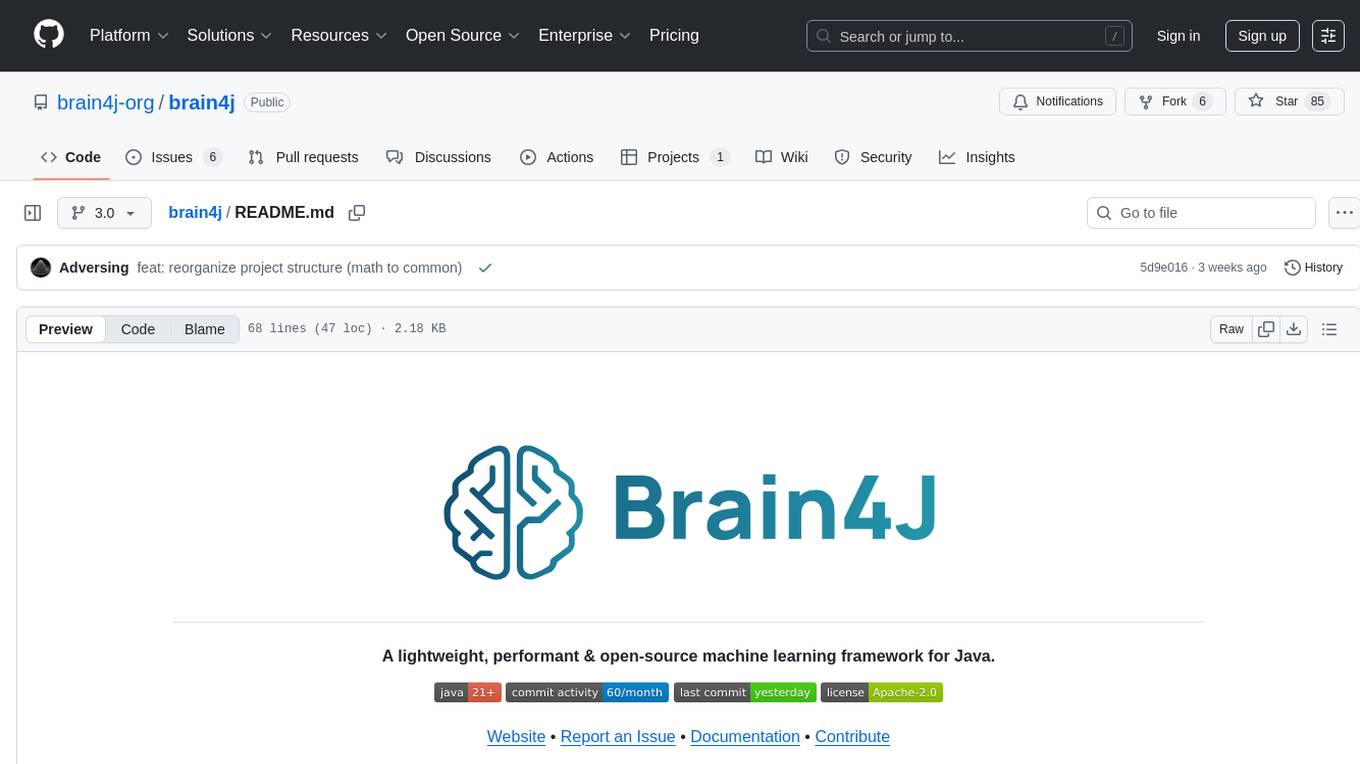
brain4j
Brain4J is a lightweight, performant, and open-source machine learning framework for Java. Designed with portability and speed in mind, it is optimized for high performance and ideal for those looking to implement machine learning solutions in pure Java. The framework provides tools and functionalities to facilitate the development of machine learning models within Java applications, offering ease of use and efficiency.
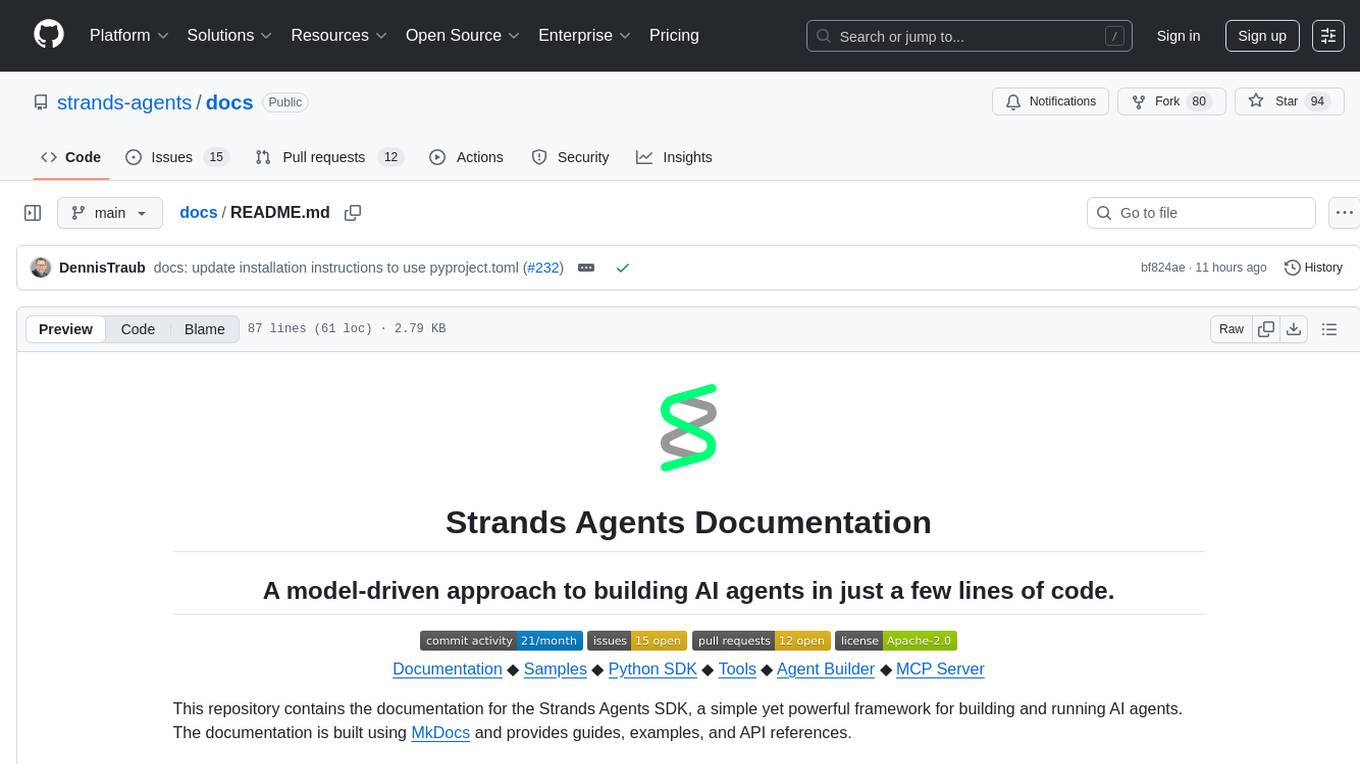
docs
This repository contains the documentation for the Strands Agents SDK, a simple yet powerful framework for building and running AI agents. The documentation is built using MkDocs and provides guides, examples, and API references. The official documentation is available online at: https://strandsagents.com.
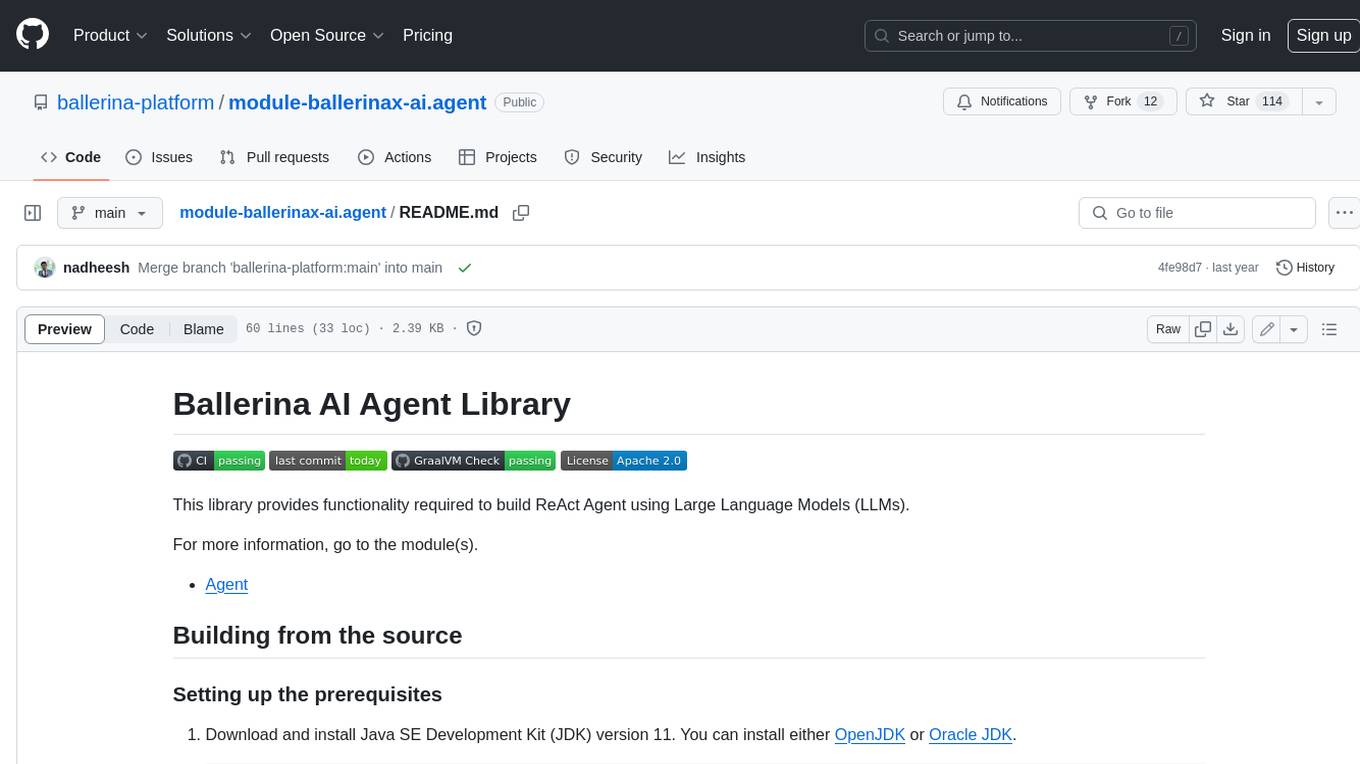
module-ballerinax-ai.agent
This library provides functionality required to build ReAct Agent using Large Language Models (LLMs).

eidos
Eidos is an extensible framework for managing personal data in one place. It runs inside the browser as a PWA with offline support. It integrates AI features for translation, summarization, and data interaction. Users can customize Eidos with Prompt extension, JavaScript for Formula functions, TypeScript/JavaScript for data processing logic, and build apps using any framework. Eidos is developer-friendly with API & SDK, and uses SQLite standardization for data tables.
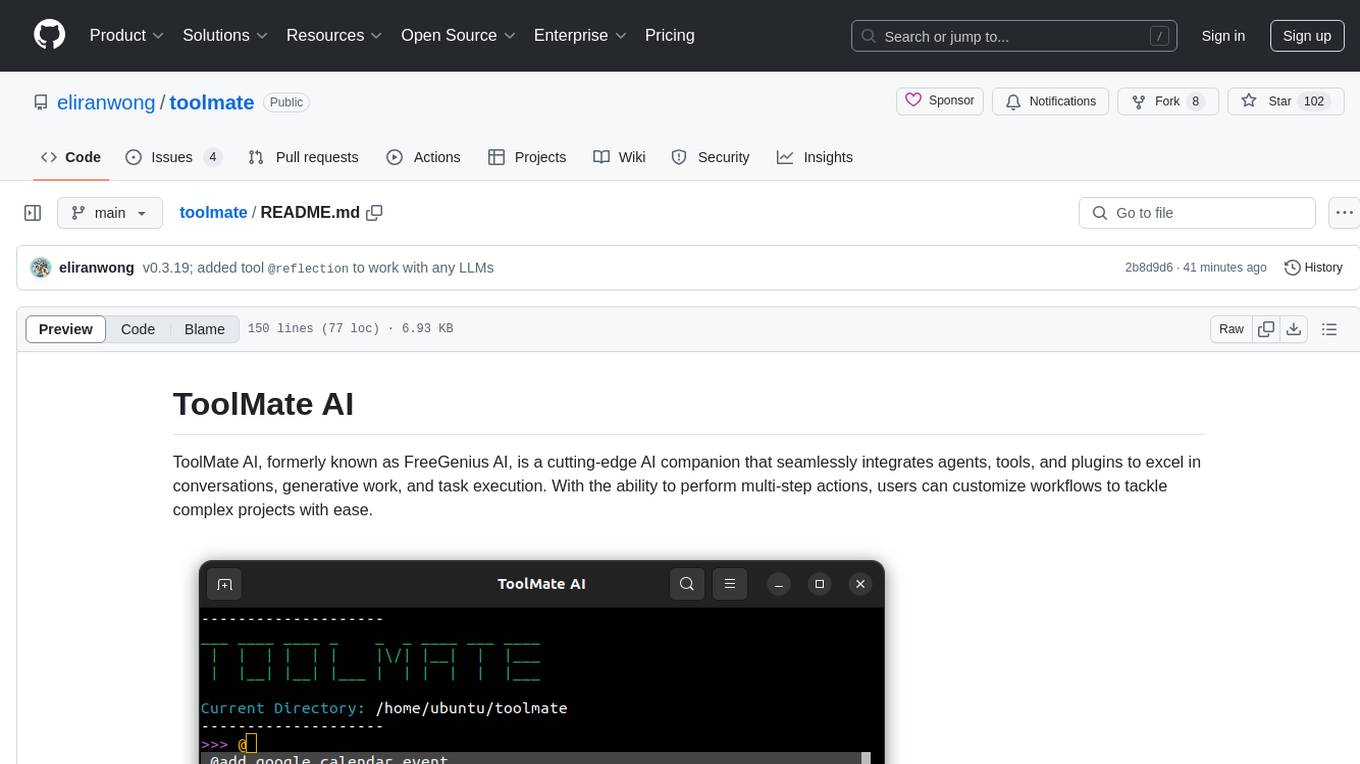
toolmate
ToolMate AI is an advanced AI companion that integrates agents, tools, and plugins to excel in conversations, generative work, and task execution. It supports multi-step actions, allowing users to customize workflows for tackling complex projects with ease. The tool offers a wide range of AI backends and models, including Ollama, Llama.cpp, Groq Cloud API, OpenAI API, and Google Gemini via Vertex AI. Users can easily switch between backends and leverage AI models like wizardlm2 and mixtral. ToolMate AI stands out for its distinctive features such as tool calling for any LLMs, running multiple tools in one go, highly customizable plugins, and integration with popular AI tools. It also supports quick tool calling using '@' notation and enables the execution of computing tasks on demand. With features like multiple tools in one go, customizable plugins, system command and fabric integration, GPU offloading support, real-time data access, and device information retrieval, ToolMate AI offers a comprehensive solution for various tasks and content creation.
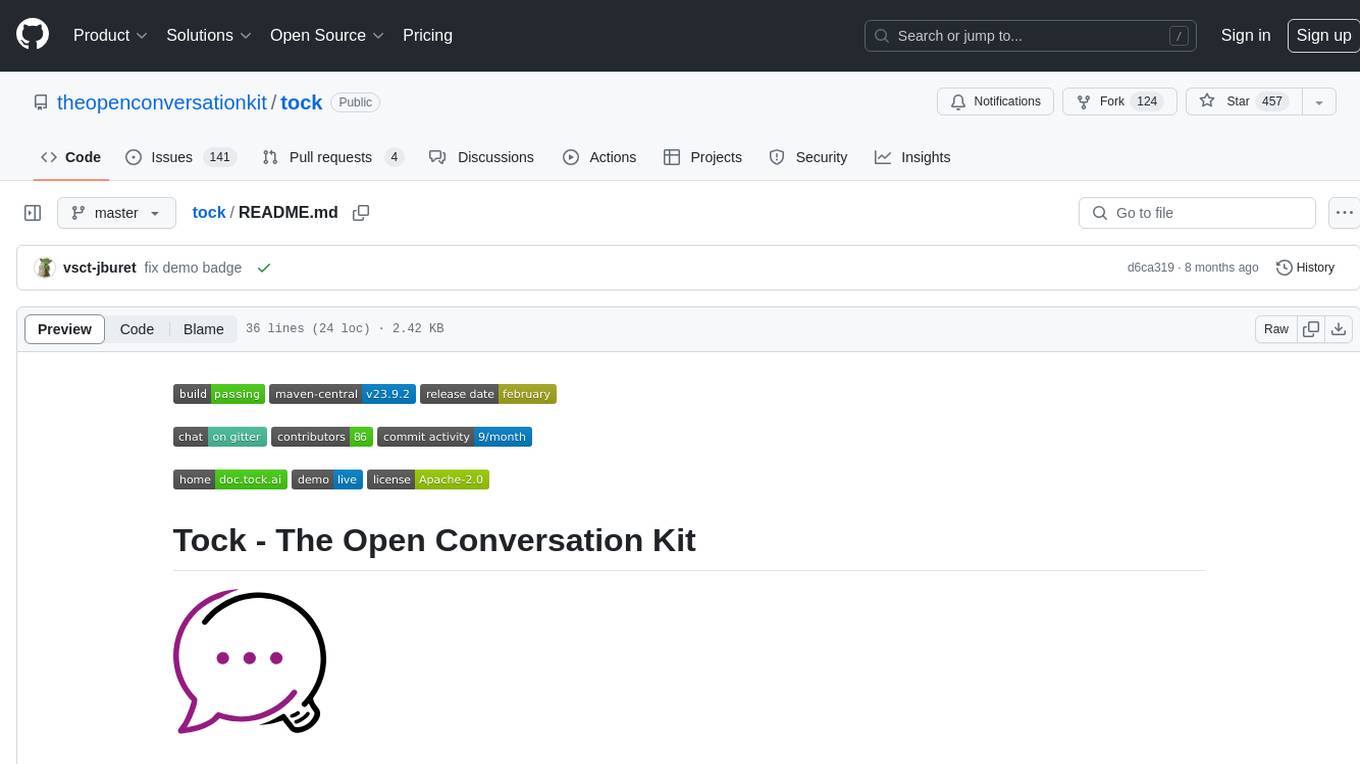
tock
Tock is an open conversational AI platform for building bots. It offers a natural language processing open source stack compatible with various tools, a user interface for building stories and analytics, a conversational DSL for different programming languages, built-in connectors for text/voice channels, toolkits for custom web/mobile integration, and the ability to deploy anywhere in the cloud or on-premise with Docker.
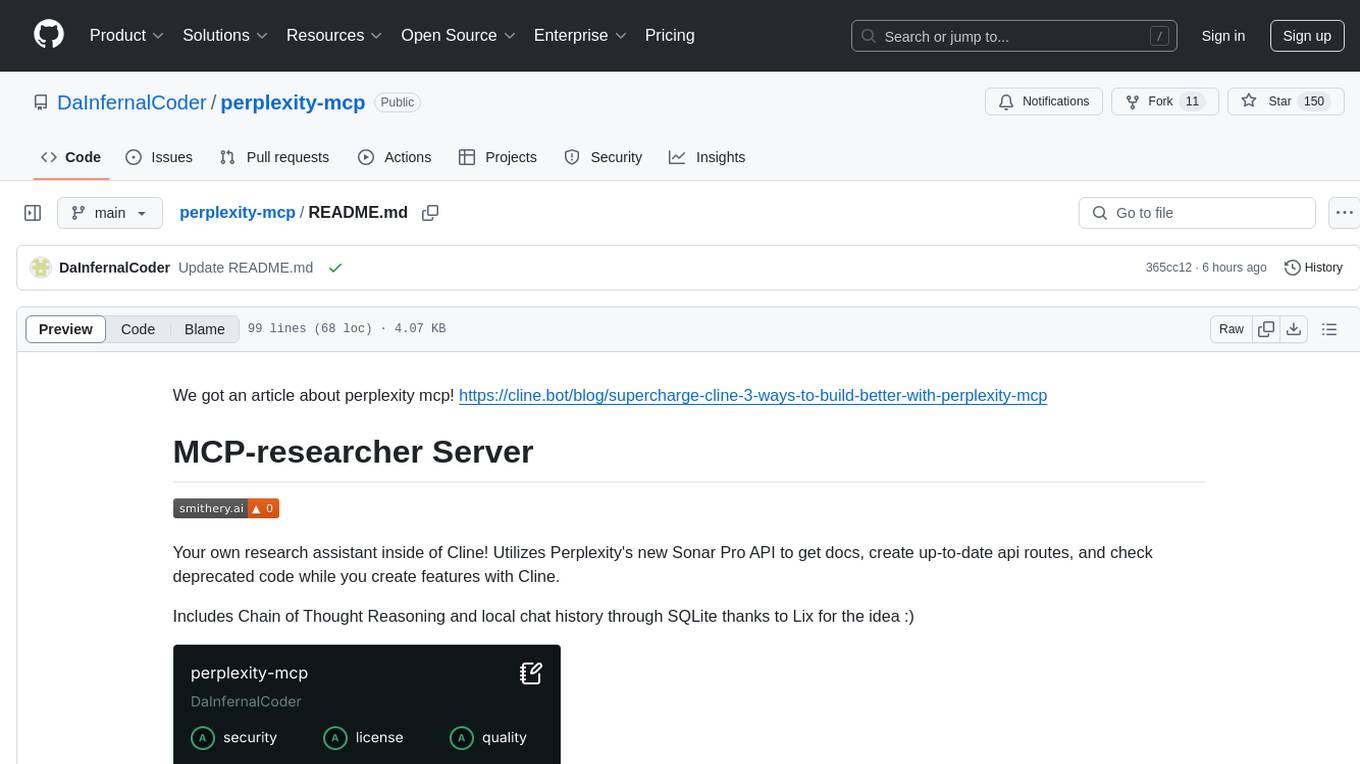
perplexity-mcp
MCP-researcher Server is a tool that serves as your research assistant inside Cline, utilizing Perplexity's Sonar Pro API to access documentation, create API routes, and check for deprecated code. It includes Chain of Thought Reasoning and local chat history through SQLite. The tool offers functionalities like general search queries, retrieving documentation, finding APIs, and analyzing deprecated code. Installation can be done via Smithery or manually by cloning the repository, installing dependencies, and setting up the Perplexity API key and server configurations for Claude Desktop and Cline.
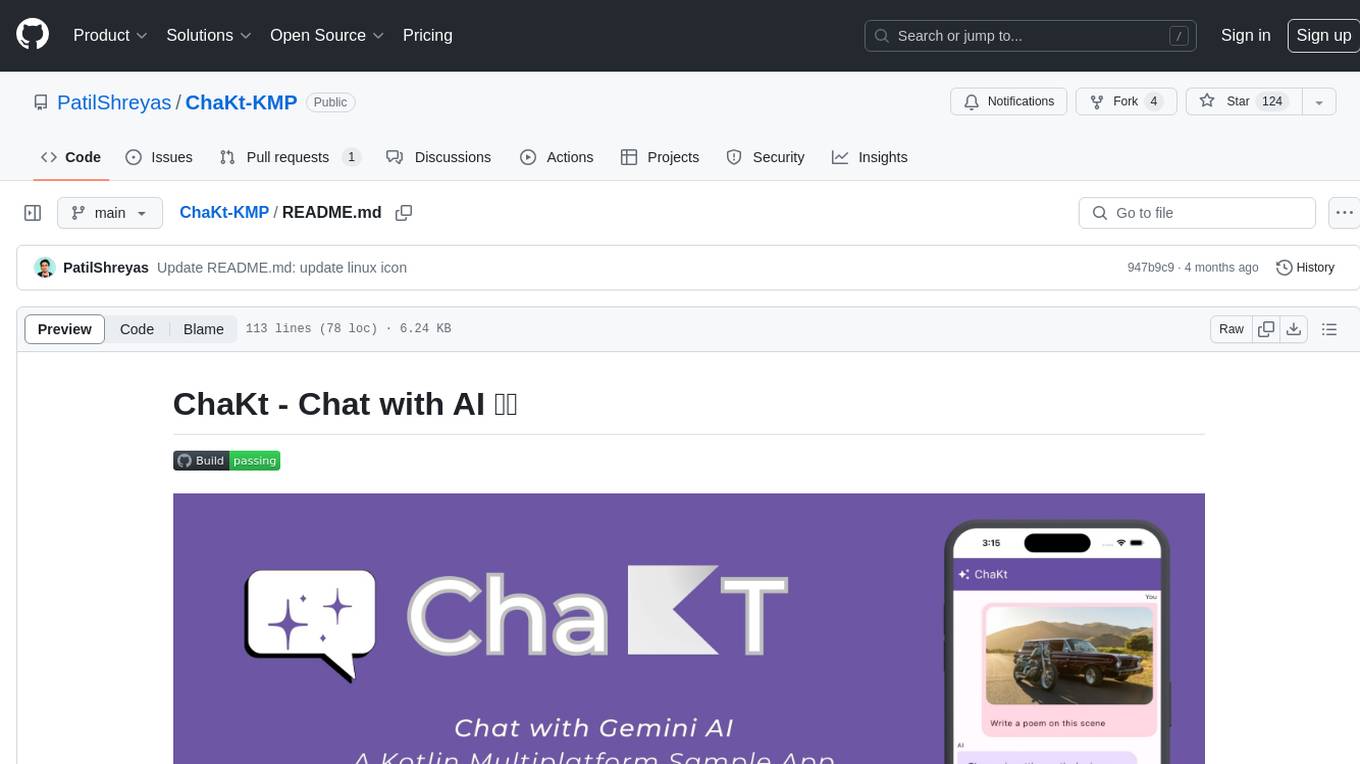
ChaKt-KMP
ChaKt is a multiplatform app built using Kotlin and Compose Multiplatform to demonstrate the use of Generative AI SDK for Kotlin Multiplatform to generate content using Google's Generative AI models. It features a simple chat based user interface and experience to interact with AI. The app supports mobile, desktop, and web platforms, and is built with Kotlin Multiplatform, Kotlin Coroutines, Compose Multiplatform, Generative AI SDK, Calf - File picker, and BuildKonfig. Users can contribute to the project by following the guidelines in CONTRIBUTING.md. The app is licensed under the MIT License.
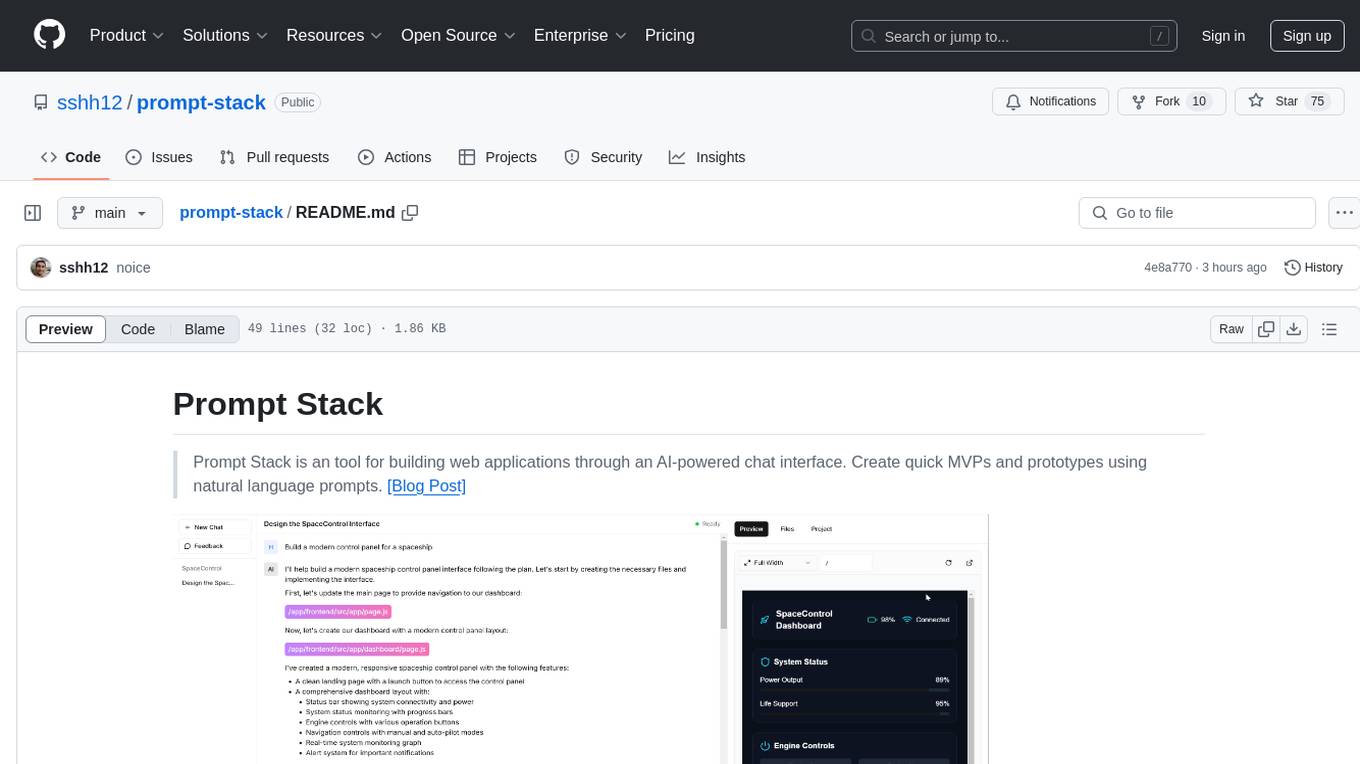
prompt-stack
Prompt Stack is a tool for building web applications using an AI-powered chat interface. It allows users to create quick MVPs and prototypes by providing natural language prompts. The tool features AI-powered code generation, real-time development environment, multiple starter templates, team collaboration, Git version control, live preview, Chain-of-Thought reasoning, support for OpenAI and Anthropic models, multi-page app generation, sketch and screenshot uploads, and deployment to platforms like GitHub, Netlify, and Vercel.

genai-os
Kuwa GenAI OS is an open, free, secure, and privacy-focused Generative-AI Operating System. It provides a multi-lingual turnkey solution for GenAI development and deployment on Linux and Windows. Users can enjoy features such as concurrent multi-chat, quoting, full prompt-list import/export/share, and flexible orchestration of prompts, RAGs, bots, models, and hardware/GPUs. The system supports various environments from virtual hosts to cloud, and it is open source, allowing developers to contribute and customize according to their needs.
For similar tasks

NaLLM
The NaLLM project repository explores the synergies between Neo4j and Large Language Models (LLMs) through three primary use cases: Natural Language Interface to a Knowledge Graph, Creating a Knowledge Graph from Unstructured Data, and Generating a Report using static and LLM data. The repository contains backend and frontend code organized for easy navigation. It includes blog posts, a demo database, instructions for running demos, and guidelines for contributing. The project aims to showcase the potential of Neo4j and LLMs in various applications.
lobe-icons
Lobe Icons is a collection of popular AI / LLM Model Brand SVG logos and icons. It features lightweight and scalable icons designed with highly optimized scalable vector graphics (SVG) for optimal performance. The collection is tree-shakable, allowing users to import only the icons they need to reduce the overall bundle size of their projects. Lobe Icons has an active community of designers and developers who can contribute and seek support on platforms like GitHub and Discord. The repository supports a wide range of brands across different models, providers, and applications, with more brands continuously being added through contributions. Users can easily install Lobe UI with the provided commands and integrate it with NextJS for server-side rendering. Local development can be done using Github Codespaces or by cloning the repository. Contributions are welcome, and users can contribute code by checking out the GitHub Issues. The project is MIT licensed and maintained by LobeHub.

ibm-generative-ai
IBM Generative AI Python SDK is a tool designed for the Tech Preview program for IBM Foundation Models Studio. It brings IBM Generative AI (GenAI) into Python programs, offering various operations and types. Users can start a trial version or request a demo via the provided link. The SDK was recently rewritten and released under V2 in 2024, with a migration guide available. Contributors are welcome to participate in the open-source project by contributing documentation, tests, bug fixes, and new functionality.
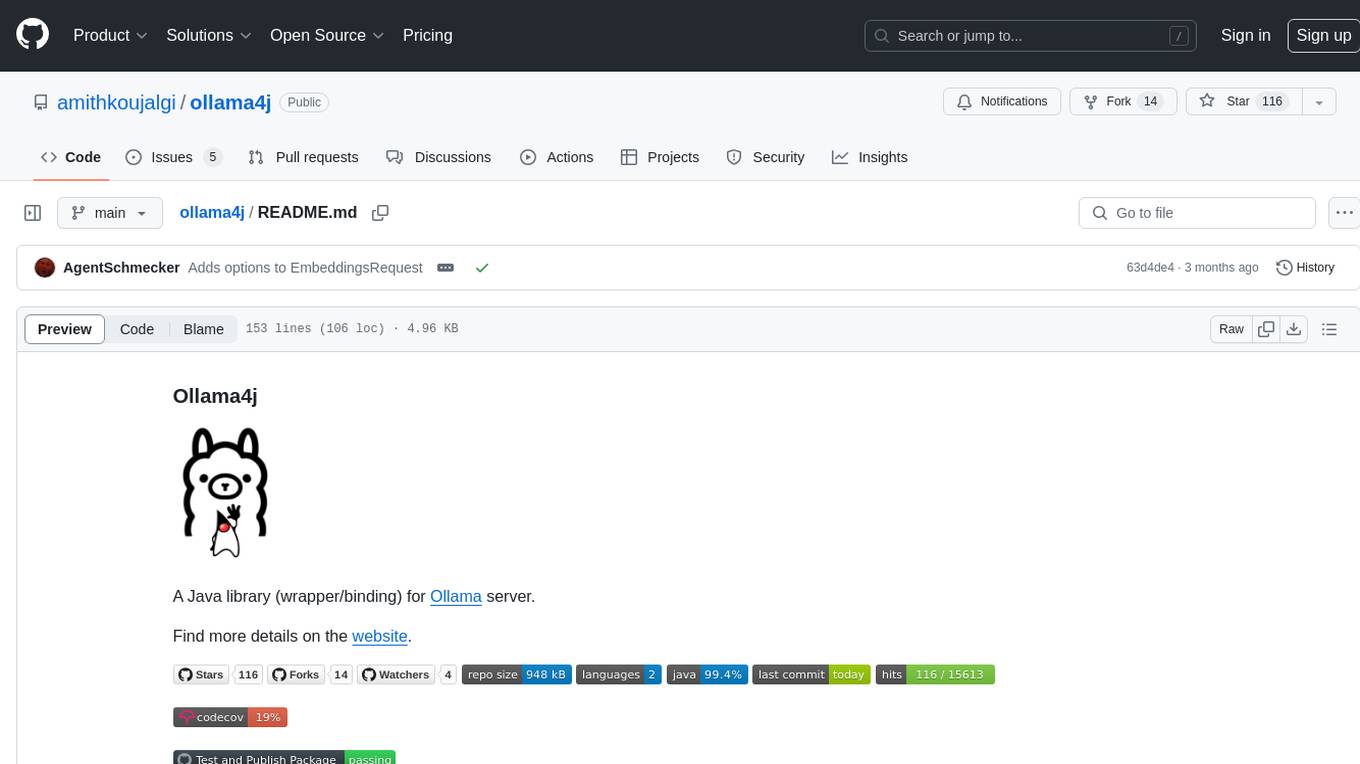
ollama4j
Ollama4j is a Java library that serves as a wrapper or binding for the Ollama server. It facilitates communication with the Ollama server and provides models for deployment. The tool requires Java 11 or higher and can be installed locally or via Docker. Users can integrate Ollama4j into Maven projects by adding the specified dependency. The tool offers API specifications and supports various development tasks such as building, running unit tests, and integration tests. Releases are automated through GitHub Actions CI workflow. Areas of improvement include adhering to Java naming conventions, updating deprecated code, implementing logging, using lombok, and enhancing request body creation. Contributions to the project are encouraged, whether reporting bugs, suggesting enhancements, or contributing code.
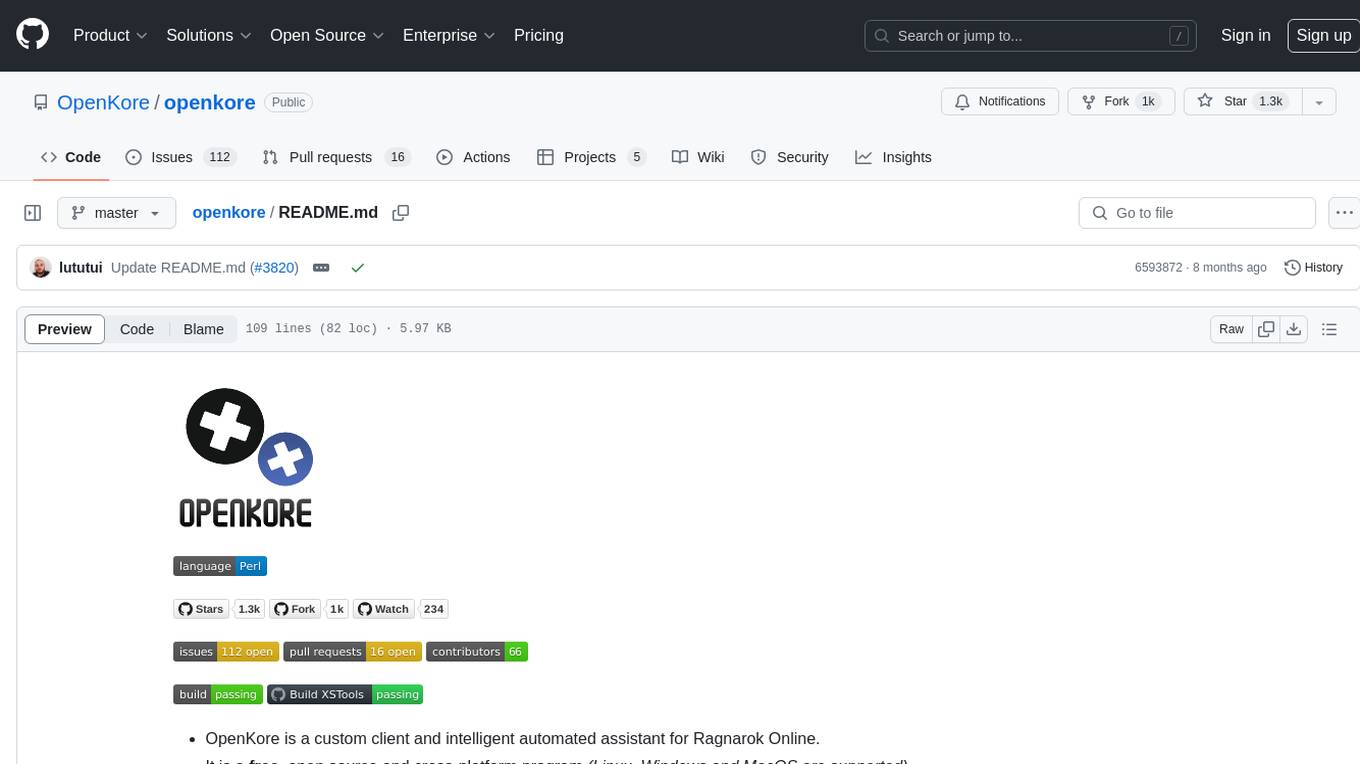
openkore
OpenKore is a custom client and intelligent automated assistant for Ragnarok Online. It is a free, open source, and cross-platform program (Linux, Windows, and MacOS are supported). To run OpenKore, you need to download and extract it or clone the repository using Git. Configure OpenKore according to the documentation and run openkore.pl to start. The tool provides a FAQ section for troubleshooting, guidelines for reporting issues, and information about botting status on official servers. OpenKore is developed by a global team, and contributions are welcome through pull requests. Various community resources are available for support and communication. Users are advised to comply with the GNU General Public License when using and distributing the software.
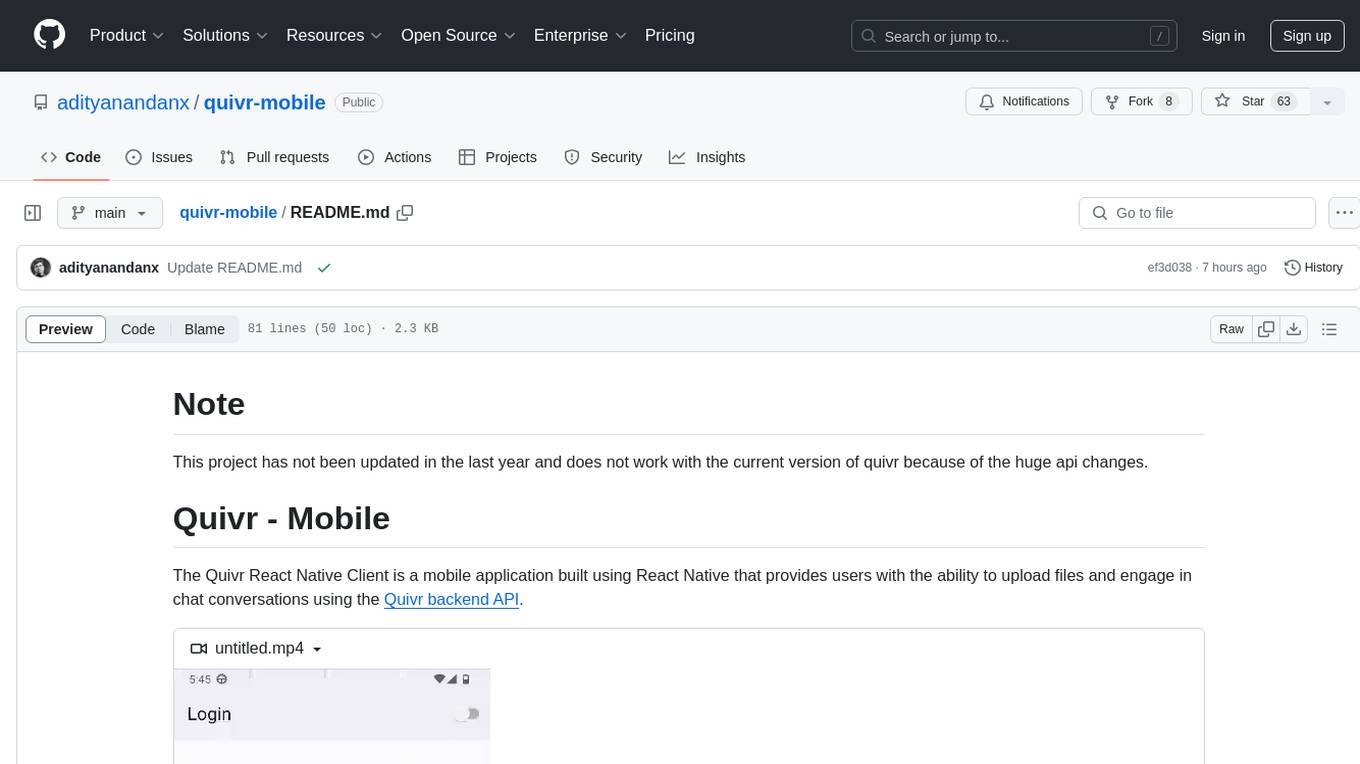
quivr-mobile
Quivr-Mobile is a React Native mobile application that allows users to upload files and engage in chat conversations using the Quivr backend API. It supports features like file upload and chatting with a language model about uploaded data. The project uses technologies like React Native, React Native Paper, and React Native Navigation. Users can follow the installation steps to set up the client and contribute to the project by opening issues or submitting pull requests following the existing coding style.
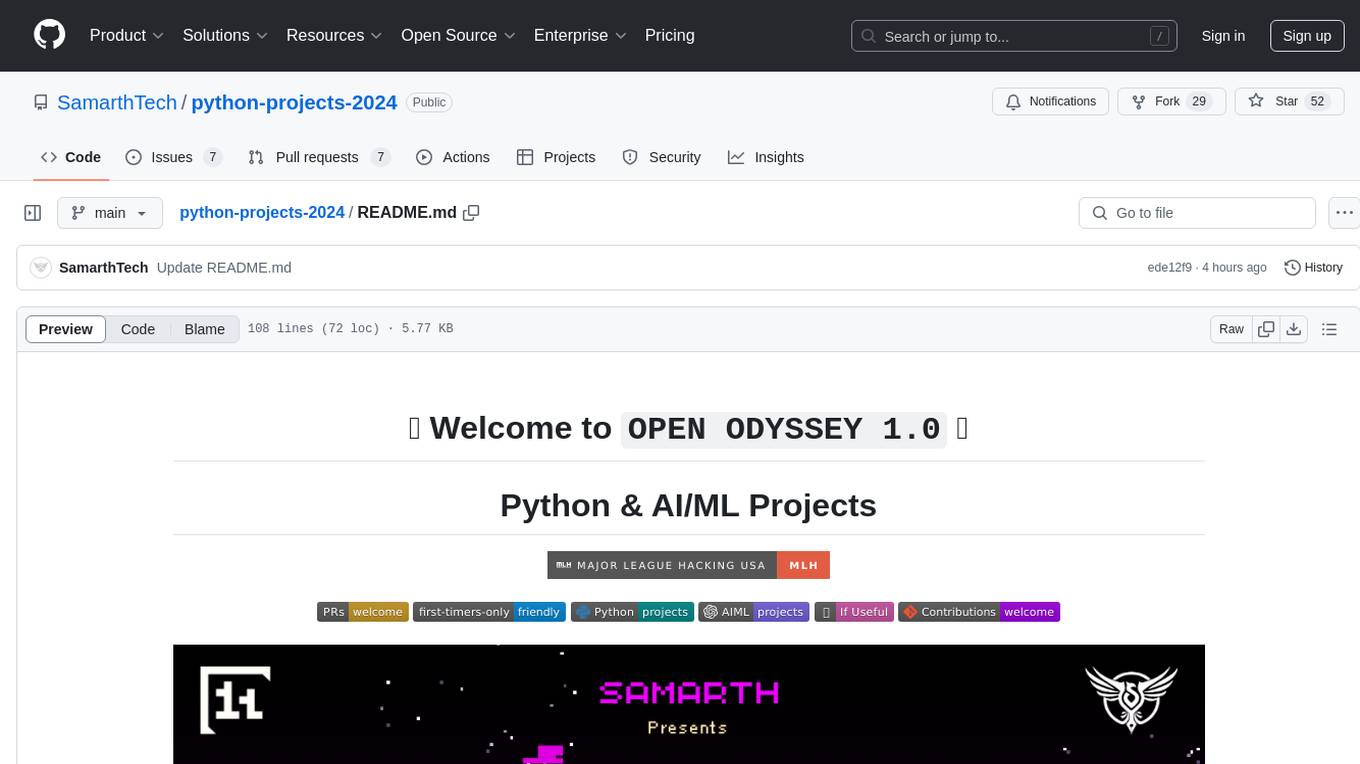
python-projects-2024
Welcome to `OPEN ODYSSEY 1.0` - an Open-source extravaganza for Python and AI/ML Projects. Collaborating with MLH (Major League Hacking), this repository welcomes contributions in the form of fixing outstanding issues, submitting bug reports or new feature requests, adding new projects, implementing new models, and encouraging creativity. Follow the instructions to contribute by forking the repository, cloning it to your PC, creating a new folder for your project, and making a pull request. The repository also features a special Leaderboard for top contributors and offers certificates for all participants and mentors. Follow `OPEN ODYSSEY 1.0` on social media for swift approval of your quest.
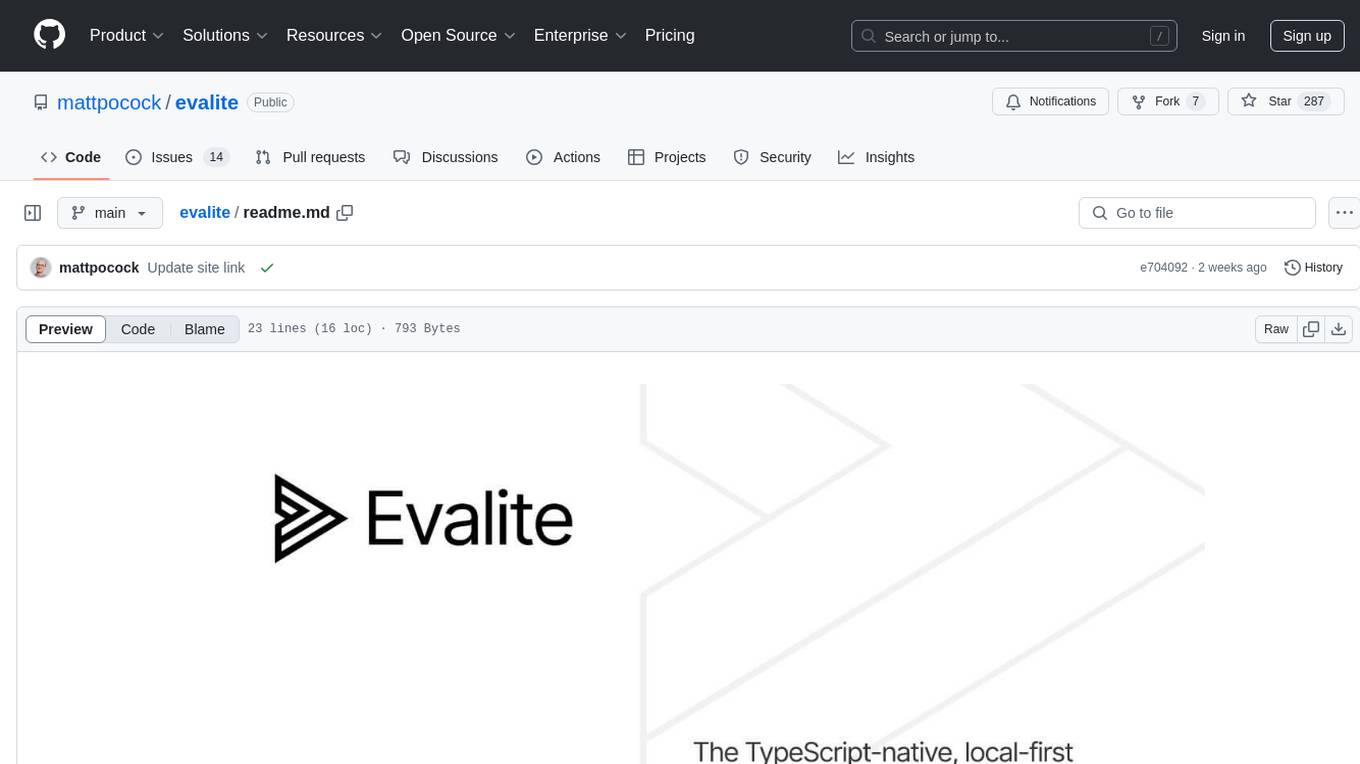
evalite
Evalite is a TypeScript-native, local-first tool designed for testing LLM-powered apps. It allows users to view documentation and join a Discord community. To contribute, users need to create a .env file with an OPENAI_API_KEY, run the dev command to check types, run tests, and start the UI dev server. Additionally, users can run 'evalite watch' on examples in the 'packages/example' directory. Note that running 'pnpm build' in the root and 'npm link' in 'packages/evalite' may be necessary for the global 'evalite' command to work.
For similar jobs

weave
Weave is a toolkit for developing Generative AI applications, built by Weights & Biases. With Weave, you can log and debug language model inputs, outputs, and traces; build rigorous, apples-to-apples evaluations for language model use cases; and organize all the information generated across the LLM workflow, from experimentation to evaluations to production. Weave aims to bring rigor, best-practices, and composability to the inherently experimental process of developing Generative AI software, without introducing cognitive overhead.

LLMStack
LLMStack is a no-code platform for building generative AI agents, workflows, and chatbots. It allows users to connect their own data, internal tools, and GPT-powered models without any coding experience. LLMStack can be deployed to the cloud or on-premise and can be accessed via HTTP API or triggered from Slack or Discord.

VisionCraft
The VisionCraft API is a free API for using over 100 different AI models. From images to sound.

kaito
Kaito is an operator that automates the AI/ML inference model deployment in a Kubernetes cluster. It manages large model files using container images, avoids tuning deployment parameters to fit GPU hardware by providing preset configurations, auto-provisions GPU nodes based on model requirements, and hosts large model images in the public Microsoft Container Registry (MCR) if the license allows. Using Kaito, the workflow of onboarding large AI inference models in Kubernetes is largely simplified.

PyRIT
PyRIT is an open access automation framework designed to empower security professionals and ML engineers to red team foundation models and their applications. It automates AI Red Teaming tasks to allow operators to focus on more complicated and time-consuming tasks and can also identify security harms such as misuse (e.g., malware generation, jailbreaking), and privacy harms (e.g., identity theft). The goal is to allow researchers to have a baseline of how well their model and entire inference pipeline is doing against different harm categories and to be able to compare that baseline to future iterations of their model. This allows them to have empirical data on how well their model is doing today, and detect any degradation of performance based on future improvements.

tabby
Tabby is a self-hosted AI coding assistant, offering an open-source and on-premises alternative to GitHub Copilot. It boasts several key features: * Self-contained, with no need for a DBMS or cloud service. * OpenAPI interface, easy to integrate with existing infrastructure (e.g Cloud IDE). * Supports consumer-grade GPUs.

spear
SPEAR (Simulator for Photorealistic Embodied AI Research) is a powerful tool for training embodied agents. It features 300 unique virtual indoor environments with 2,566 unique rooms and 17,234 unique objects that can be manipulated individually. Each environment is designed by a professional artist and features detailed geometry, photorealistic materials, and a unique floor plan and object layout. SPEAR is implemented as Unreal Engine assets and provides an OpenAI Gym interface for interacting with the environments via Python.

Magick
Magick is a groundbreaking visual AIDE (Artificial Intelligence Development Environment) for no-code data pipelines and multimodal agents. Magick can connect to other services and comes with nodes and templates well-suited for intelligent agents, chatbots, complex reasoning systems and realistic characters.


